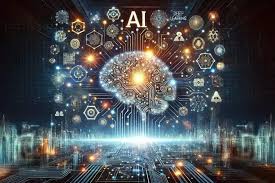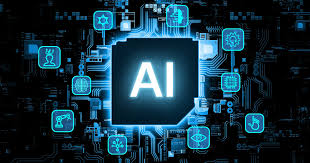In 2025, accounting isn’t just about balancing books or chasing receipts anymore. The industry is changing — fast. Artificial Intelligence (AI) has stepped into the spotlight, transforming how firms operate, how accountants think, and even how clients make decisions. What used to be endless spreadsheets and manual reconciliations is now a world of real-time insights, predictive analytics, and smarter business moves.
This isn’t a quiet evolution. It’s a full-scale reinvention of the profession.

Automation: Less Time Crunching, More Time Thinking
For decades, accountants were buried in the details — reconciling statements, classifying expenses, double-checking every number. Tedious? Absolutely. Necessary? Also yes.
But now, AI is lifting that weight. Automation software can handle repetitive tasks like transaction categorization and bank reconciliation in seconds. Some firms report cutting manual work by nearly 80 percent. That’s not just efficiency — that’s freedom.
Imagine logging into your firm’s dashboard and seeing every transaction already analyzed, exceptions flagged, and reports ready to go. Instead of chasing errors, you’re chasing opportunities.
A 2025 survey found that over 40 percent of accountants are now using AI for automation and task management — up from last year. And the trend is only accelerating. As one senior accountant recently said, “AI doesn’t replace us. It gives us time to finally do what we were trained to do — think.”
From Compliance to Insight: The New Face of Accounting
Automation is just the beginning. The real revolution lies in what accountants do with their newfound time.
Firms everywhere are moving beyond compliance work and into strategy. With AI handling the numbers, accountants are now guiding clients toward smarter financial decisions — predicting cash flow, assessing risk, and mapping growth opportunities.
This shift is profound. It means the accountant is no longer just the “numbers person.” They’re becoming a trusted advisor — someone who helps shape the future of a business.
In fact, 79 percent of firms expect advisory services to grow in the coming years, and many say AI is the catalyst. It’s not just about faster work — it’s about deeper understanding.
As one partner at a mid-sized firm put it: “AI helps me see patterns I couldn’t before. But it’s my job to turn those patterns into stories clients can act on.”
Real Stories: What AI Looks Like Inside Accounting Firms
Let’s get specific. Here’s what this AI-powered world actually looks like on the ground:
-
- Smarter Audits: The Big Four are using generative AI to review documentation and flag inconsistencies, turning what used to be weeks of checking into hours.
-
- Tax Research Reinvented: AI chatbots can now comb through massive tax databases to answer complex questions — saving professionals hours and reducing human error.
-
- Real-Time Bookkeeping: Continuous reconciliation tools monitor transactions 24/7, freeing up human accountants to focus on analysis, not data entry.
-
- Talent Magnet: Younger professionals are actively seeking firms that use AI tools. For them, it’s not a perk — it’s an expectation.
Across the industry, the message is clear: if your firm isn’t using AI yet, you’re already behind.

The Push and Pull: What’s Driving (and Worrying) Firms
🚀 Why Firms Are All In
AI isn’t just about shiny tech. It’s about results. Firms report faster workflows, fewer mistakes, and better insights. Many say AI improves client satisfaction and boosts profitability. It’s a no-brainer from a business perspective.
Plus, in a competitive job market, AI-savvy firms are winning the talent war. New graduates want to work with tools that match the digital world they grew up in — not outdated spreadsheets.
⚠️ But There Are Real Concerns
Still, not everything about this transformation feels smooth. Roughly 70 percent of accountants cite data security as their top concern. And nearly half worry that automation might chip away at the human relationships that have always been the soul of accounting.
There’s also the challenge of scale. Many firms are experimenting with AI in small pockets — but only a fraction have fully embedded it across departments. Training, governance, and trust are the next big hurdles.
Looking Ahead: The Future Is Intelligent
For those in the profession, 2025 feels like standing on the edge of something big.
The firms that succeed will be the ones that embrace change — not fear it. Already, forward-thinking leaders are redesigning their workflows entirely around AI. They’re building teams that blend finance, technology, and analytics. They’re retraining staff to interpret data, not just record it.
AI isn’t replacing accountants. It’s reshaping them. The best professionals of tomorrow won’t just understand numbers — they’ll understand the stories those numbers tell.
Here’s what’s next:
-
- Integrated AI systems built into every workflow.
-
- Predictive analytics that forecast problems before they happen.
-
- Smarter regulation as governments and firms adapt together.
-
- A new skill set — where empathy, communication, and tech fluency matter as much as technical accuracy.
The job title may stay the same, but the meaning of “accountant” is changing fast.
What It Means for Businesses
If you’re a business owner, this shift is great news. Your accountant is about to become more valuable than ever. Expect faster turnaround times, cleaner reports, and deeper insights into your company’s performance.
But expect something else, too: more collaboration. Accountants will want to integrate your systems, analyze real-time data, and work alongside you — not just for you. The days of once-a-year reviews are fading. Continuous insight is the new normal.
Still, it’s worth choosing your accounting firm wisely. Ask how they’re using AI, how they protect your data, and what kind of insights they can provide. In 2025, technology isn’t just a differentiator — it’s the new baseline.

Final Thoughts: The Human Side of AI
Let’s be honest — numbers have always told stories. But now, thanks to AI, we can read those stories faster, clearer, and with more meaning.
The firms that thrive in 2025 will be those that blend the intelligence of machines with the empathy of people. Automation may handle the heavy lifting, but it’s still human intuition that drives trust, creativity, and vision.
Accounting isn’t losing its heart. It’s gaining a brain.
And that combination — heart and intelligence — might just be the most powerful equation the industry has ever seen.
Curious about AI transforming accounting further? See